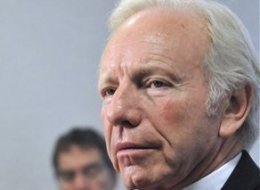
Senator Joseph Lieberman's (I-Conn) decision on Monday to oppose allowing the Bush tax cuts for the wealthy to expire produced predictable groans among progressives. But in a telling reflection of how much an irritant the Connecticut Independent-Democrat has become within his own party, even officials on the Hill did little to hide their frustration with his new-found position on tax cuts.
A Senate Democrat aide, whose boss opposes extending the tax cuts for the wealthy, took the step of compiling a list of old Lieberman quotes in which the senator resoundingly expressed his desire to see those rates revert back to pre-Bush levels.
Here, for instance, is Lieberman on Sep. 25, 2003 during a presidential debate at Pace University:
And immediately as president, I would attempt to repeal the Bush tax cuts on the highest income Americans, they don't need it. It sent us in a deficit that will cost the middle class, and our children and grandchildren, all sorts of money in the future.
Here is Lieberman on January 25, 2004, responding to an AP questionnaire on what parts of the 2001 tax cut package he would change, if any:
Here's what I'll do: Repeal the tax cuts for the wealthy; maintain the tax cuts for the middle class, including the increase in the child tax credit and elimination of the marriage penalty; cut taxes for 98 percent of taxpayers; restore the dividend tax that Bush repealed; reform the estate tax that Bush repealed; eliminate wasteful corporate loopholes and subsidies that Bush has protected.
And here is Lieberman during the Democratic 2004 primary debate at St. Anselm College Jan 22, 2004:
I have come out for genuine tax reform, not only to protect the middle-class tax cuts that middle-class families did get in the last three years, but to pass a tax cut for 98% of the income tax payers and to pay for it by raising taxes on the 2%. That may make some of the higher-income people unhappy, but it's the right thing to do for the middle class and for our economy.
The context of those remarks is, of course, notably different from the statement Lieberman offered on Monday, when he announced that it didn't make "sense to raise any federal taxes during the uncertain economy we are struggling through." Unemployment -- among other economic metrics -- is far worse now than it was then. And Lieberman, as his office pointed out, felt compelled to change positions based on those dynamics.
"I thought we needed to pay the costs of the war we were fighting after 9/11, and we needed to stay out of debt," he said, on Monday, of his past position. "But now in our current economic situation, we cannot risk the economic headwinds that would be caused by tax increases. We need to keep as much money as possible in people's pockets and business's bank accounts."
http://www.huffingtonpost.com/2010/09/14/lieberman-in-2003-repeal-_n_716289.html